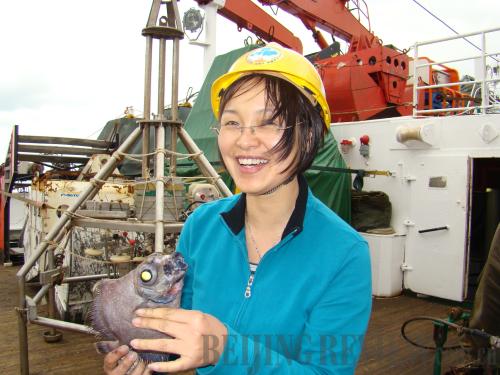|
 |
|
GLOBE TROTTER: Han Xiqiu, China's marine scientist extraordinaire(COURTESY OF HAN XIQIU) |
If ever a person had an apt name for the work she does, it must be Han Xiqiu. Literally meaning "loving the globe," Xiqiu perfectly describes the globetrotting Han does as a scientist exploring the ocean floors.
"That's my original name and I didn't change it," said 41-year-old Han in an interview with ChinAfrica.
Han has been working in the field of marine science for 17 years. "You can imagine how fascinating it is to explore the unknown world under the vast ocean. I'm living my dream."
That dream has taken her to 19 countries and regions in six continents along with all the major oceans in the past eight years.
She is the first woman to achieve the position of chief scientist in the history of Chinese ocean scientific expedition and is now working for the Second Institute of Oceanography under the State Oceanic Administration in Hangzhou, Zhejiang Province.
In 2007, Han participated in China's DY19 leg 2 of transoceanic voyage as an assistant chief scientist. For the first time in history, a new "black smoker" (see explanation box) was first discovered by Chinese scientists. The black smoker is regarded as one of the world's biggest scientific discoveries in recent years. During the third leg of the cruise that year, Han became the country's first female scientist to hold that position, and her team discovered four new hydrothermal areas.
Han had to search the ocean bed inch by inch with equipment connected by coaxial cable to the research ship to find the smoker. For her success, she was recognized as one of China's top five young female scientists in late 2008, and was selected as one of the 10 most influential women in China in early 2009.
Simple choices
Han's road to success was never an easy one. She believes it was paved with many coincidences and a large dose of luck.
"I did not have a far-sighted view in choosing my road. I just made some simple choices," said Han, while talking about her choice of science as a career.
A native of the rural area of Taizhou City, Zhejiang Province first choice came in 1986 when considering university options. "I chose to major in geology only because it was easier to be admitted as fewer people chose this major."
After four years at Chengdu College of Geology (now Chengdu University of Technology), she was recommended to study for a master's degree. After graduation, she made her second important choice. In 1993, Han went to work at the Second Institute of Oceanography under the State Oceanic Administration. "My reason for this choice is very simple: the institute is close to my hometown." But it was the simple choice that produced China's first female chief scientist in maritime research.
Long lonely days
During 1993 to 2001, Han did an excellent job on the study of manganese nodule resources and the environmental archive of the Pacific Ocean. In 2001, Han was invited to give a lecture at the University of Kiel in Germany. It led to an eventual four-year stay in the country and participation in four maritime explorations.
"My experience during this period of time helped me a lot in my work after I came back to China," she said.
In 2005, China launched its first maritime global survey for scientific research. As Han had the experience of ocean exploration, she was selected as the assistant to the chief scientist to design navigation routes.
After two years of hard work, Han independently led the third leg of the 19th transoceanic voyage, and successfully discovered the black smoker.
According to Han, who is now well known in academic circles, her work requires not only a rigorous scientific approach, but also the patience to withstand long periods on her own. "Since 2002, I have taken at least one maritime voyage of one to three months," said Han.
In April this year, Han led her team back to the Indian Ocean for DY21 leg 7, in the process discovering one new hydrothermal sulfide activity field.
"People often cite me as an example of a successful woman. But I believe that all the successful women achieve their success through decades of hard work," said Han. "I hope my case can inspire young women. If I can make it, they can too."
Black Smokers
A black smoker is a type of hydrothermal vent or underwater hot spring found on the ocean floor. They are formed in fields hundreds of meters wide when superheated water from below Earth's crust comes through the ocean floor. This water is rich in dissolved minerals from the crust, most notably sulfides. When it comes in contact with cold ocean water, many minerals precipitate, forming a black chimney-like structure around each vent. The metal sulfides that are deposited can become massive sulfide ore deposits.
Finding a black smoker means discovering a mineral bed. Conditions around a black smoker are similar to those of the earth at its origin. Studying the composition of these conditions helps people know more about the origin of life.
Sources: Wikipedia and Xinhua |